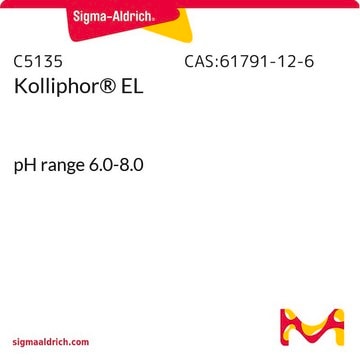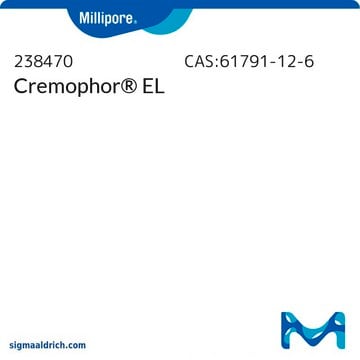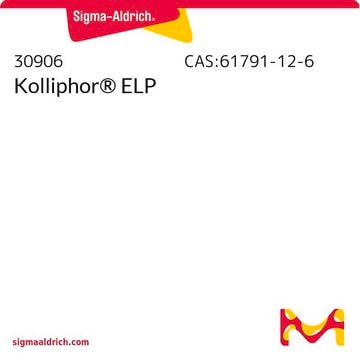32211
Chloroforme
puriss. p.a., reag. ISO, reag. Ph. Eur., 99.0-99.4% (GC)
Synonyme(s) :
Trichlorométhane, Trichlorure de méthylidyne
About This Item
Produits recommandés
Agence
USP/NF
reag. ISO
reag. Ph. Eur.
Niveau de qualité
Densité de vapeur
4.1 (vs air)
Pression de vapeur
160 mmHg ( 20 °C)
Qualité
puriss. p.a.
Pureté
99.0-99.4% (GC)
Forme
liquid
Contient
~1% ethanol as stabilizer
Technique(s)
RNA extraction: suitable
Impuretés
≤0.00001% free chlorine (Cl)
≤0.00005% free acid (as HCl)
≤0.0005% non-volatile matter
≤0.005% aldehydes and ketones (as CH3COCH3)
≤0.005% carbonyl compounds (as CO)
≤0.01% tetrachloroethene (GC)
≤0.01% tetrachloromethane (GC)
≤0.01% trichloroethene (GC)
≤0.01% water (Karl Fischer)
≤0.03% dichloromethane (GC)
0.6-1.0% ethanol (GC)
Indice de réfraction
n20/D 1.445 (lit.)
Point d'ébullition
60.5-61.5 °C (lit.)
Pf
−63 °C (lit.)
Densité
1.476-1.483 g/mL at 20 °C
1.492 g/mL at 25 °C (lit.)
Traces d'anions
chloride (Cl-): ≤1 mg/kg
Traces de cations
Al: ≤0.5 mg/kg
B: ≤0.02 mg/kg
Ba: ≤0.1 mg/kg
Ca: ≤0.5 mg/kg
Cd: ≤0.05 mg/kg
Co: ≤0.02 mg/kg
Cr: ≤0.02 mg/kg
Cu: ≤0.02 mg/kg
Fe: ≤0.1 mg/kg
Mg: ≤0.1 mg/kg
Mn: ≤0.02 mg/kg
Ni: ≤0.02 mg/kg
Pb: ≤0.05 mg/kg
Sn: ≤0.1 mg/kg
Zn: ≤0.1 mg/kg
Chaîne SMILES
ClC(Cl)Cl
Adéquation
complies for appearance
complies for reaction against H2SO4
complies for suitability of determ. w. dithizone
InChI
1S/CHCl3/c2-1(3)4/h1H
Clé InChI
HEDRZPFGACZZDS-UHFFFAOYSA-N
Vous recherchez des produits similaires ? Visite Guide de comparaison des produits
Catégories apparentées
Description générale
Application
- Extraction of RNA from plant cells.
- Preparation of dioleoylphosphatidylcholine (DOPC) solution.
- Dissolution of 1,2-distearoyl-sn-glycero-3-phosphocholine (DSPC).
Autres remarques
Chloroform Miscibility/Immiscibility Table
The article number 32211-4X2.5L-M will be discontinued. Please order the single bottle 32211-2.5L-M which is physically identical with the same exact specifications.
The article number 32211-6X1L will be discontinued. Please order the single bottle 32211-1L which is physically identical with the same exact specifications.
The article number 32211-6X1L-M will be discontinued. Please order the single bottle 32211-1L-M which is physically identical with the same exact specifications.
Mention d'avertissement
Danger
Mentions de danger
Classification des risques
Acute Tox. 3 Inhalation - Acute Tox. 4 Oral - Carc. 2 - Eye Irrit. 2 - Repr. 2 - Skin Irrit. 2 - STOT RE 1 Oral - STOT SE 3
Organes cibles
Central nervous system, Liver,Kidney
Code de la classe de stockage
6.1D - Non-combustible acute toxic Cat.3 / toxic hazardous materials or hazardous materials causing chronic effects
Classe de danger pour l'eau (WGK)
WGK 3
Point d'éclair (°F)
does not flash
Point d'éclair (°C)
does not flash
Certificats d'analyse (COA)
Recherchez un Certificats d'analyse (COA) en saisissant le numéro de lot du produit. Les numéros de lot figurent sur l'étiquette du produit après les mots "Lot" ou "Batch".
Déjà en possession de ce produit ?
Retrouvez la documentation relative aux produits que vous avez récemment achetés dans la Bibliothèque de documents.
Les clients ont également consulté
Notre équipe de scientifiques dispose d'une expérience dans tous les secteurs de la recherche, notamment en sciences de la vie, science des matériaux, synthèse chimique, chromatographie, analyse et dans de nombreux autres domaines..
Contacter notre Service technique










